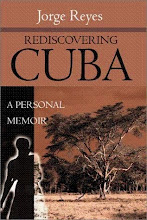The Left and the Right, and the in-between
By Jorge Reyes
As a civil libertarian, I've always been fascinated by the political and judicial realignment that often occurs in our culture. Some sociologists have written that these changes often mirror the coming together of new coalitions due to generational changes.
This is nothing new, of course. The realignment can be of short duration. Other times it can have lasting effects.
Generational changes often also translate how the culture wants to define and redefine the role of government, the role of our institutions, the role of private interchanges even.
The next few months the Supreme Court will decide a couple of cases that some have observed are signs of a realignment between conservative, left-wingers, libertarians and business groups. Talk about an odd group!
Conservative groups such as the Heritage Foundation, the American Civil Liberties Union, the CATO institute, the Federalist Group, among others, have all written friend of the court briefs critical of the role of government's tough-on-crime policies.
Edwin Meese III, who was the attorney general under Ronald Reagan and who in the past has called the ACLU “a criminal body”, has now joined forces with those same groups combating what he feels is the increasingly dangerous vagueness of federal law and its intrusive role on the states. Meese is now a fellow of the Heritage Foundation.
The Heritage Foundation, one of the most conservative advocacy groups, has underscored the fact that currently there are 4,400 criminal offenses in the federal code so vague that any of us could practically be charged with a federal crime. As an example, under federal law it is a crime to give a false weather report. Can you imagine all those TV weatherman?
Three Supreme Court cases exemplify this political and judicial realignment. One deals with the meaning and intent of Federal Law 1346 or “honest services” fraud as it is known, where there is suspicion of dishonesty or fraud that deprives victims of an intangible right to honest services that may not be that apparent. And that's the problem, what are honest and intangible services? As interpreted in the past, honest services comes into play when someone either in the public or private sector acts in a dishonest manner in his or her business dealings. Evidence may not be tangible to prove fraud, such as when victims as cheated or bilked out of moneys fraudulently.
Justice Antonin Scalia has sharply criticized this “honest services” law as vague and overbroad, and a break from history and criminal precedent. Writing in February he stated that “it seems to me quite irresponsible to let the current chaos prevail."
In effect as some have argued, under this law Cardinal Roger Mahoney, from the archdiocese of Los Angeles, could be charged with the commission of a crime by harboring pedophile priests or by simply moving them around to another parish in order to protect the churche's interests. In Bonita Springs, Florida, a man named Samir Cabrera was convicted of six counts of wire fraud using the “honest services” approach when prosecutors made a convincing claim that Cabrera bought two properties at market value and then flipped them at a higher price failing to disclose his earnings to investors but pocketing the difference.
Other cases to be noted is Alvarez v. Smith and United States v. Comstock.
At issue in Alvarez is whether or not the state of Illinois can hold on to a seized property indefinitely. At issue in Comstock, which will be heard in January, is whether people convicted of a sexual offense can be held in confinement after they have served their criminal sentences.
I love it when people change their views across a wide spectrum of political, legal and cultural views. A law that remains in the book from time immemorial serves no one any purpose. A political system that becomes monolithic and representative of a particular brand of ideology, be it from a social or financial group to the exclusion of others, tends to fracture and turn into itself, churning out five-second sound-bytes and cliques as opposed to values. And good values is what everyone, of any political spectrum, seems to want.
The main problem as I see it is that we're too used with the labels of Left and Right and have become afraid and even apologetic about thinking outside the box of what's expected. However, it much more fulfilling recognizing that one has a right to think differently and independently. Lest we forget, thinking differently and often radically different is an American value, one of its most cherished. What we learn, who we are, what we want to do and leave behind as a legacy, is never a commandment writ in stone forever more. Unfortunately, it is much easier to live with cliques and mass-produced ideas; we've gotten used to the easily palatable.
The Right has a productive history criticizing the tendency in all of us to use the power and stick of the state to create results. The Left has an equally rich history criticizing entrenched, pro-rich monopolies to the exclusion of the life and struggles of everyday men or women. In between, there is such diversity of opinions that labels such as pro-life or pro-abortion, pro-gay or anti-gay, theist or atheist become non-issues.
We have forgotten to listen and to learn from one another-- the left, the right, or the middle-way.
That's a shame, and one the greatest problems we face as a nation for there is much to learn from even new ideas we consider anathema to our values.




No comments:
Post a Comment